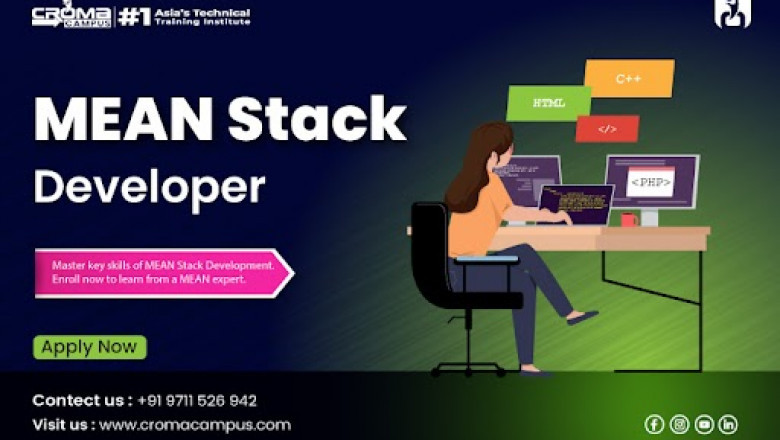views
MEAN Stack Perfect for Quick and Flexible Web Development
Noida is one of India’s fastest-growing tech hubs. Startups and IT companies here are looking for faster ways to build websites and apps. Many are now choosing the MEAN Stack because it is quick, flexible, and powerful. No wonder the demand for a MEAN Stack Course in Noida is rising sharply.
Delhi is also moving fast. Companies here are pushing for digital services in healthcare, finance, and education. They need solutions that can be built quickly and scaled easily. This is why MEAN Stack Training in Delhi is becoming very popular among students and working professionals. Let’s understand why MEAN Stack is the perfect choice today.
Reasons Why MEAN Stack is Perfect for Web Development
Same Language Everywhere: JavaScript
MEAN Stack uses JavaScript for everything. Front-end, back-end, and database — all work with JavaScript. This saves a lot of time. Developers do not have to switch between languages like PHP, Python, or SQL. One language means faster coding, easier debugging, and smoother teamwork.
In Noida’s fast-moving tech world, this matters a lot. Companies want developers who can build full apps without jumping between too many technologies. When you join a MEAN Stack Developer Course, you learn to master JavaScript deeply, not just lightly touch many languages.
Express.js, Angular, and Node.js all work with JavaScript. MongoDB stores data in a way that looks just like JavaScript objects. This makes MEAN Stack very clean and simple to manage.
Fast and Non-Blocking Operations
Node.js handles many things at once. It does not block one task while waiting for another to finish. This is called non-blocking I/O. It makes applications super fast. Older stacks like PHP or Java wait for each request to finish before starting a new one. This slows down apps, especially when thousands of users connect at once.
In Delhi’s startup scene, real-time apps like delivery tracking or stock trading apps are growing. They need speed and handling of many users at the same time. This is why MEAN Stack Training in Delhi focuses a lot on teaching how to build non-blocking applications.
Node.js also uses event-driven programming. This means it reacts quickly to actions like button clicks, payments, or chat messages. Perfect for building fast and interactive websites.
Flexible and Scalable Data Storage with MongoDB
MongoDB stores data in a very flexible way. You don’t have to stick to a strict table-like structure. You can add new fields anytime.
For startups in Noida and Delhi, this is gold. Business models change fast. If the app needs to change tomorrow, developers don’t have to rebuild the whole database.
Also, MongoDB is easy to scale. It can be spread across many servers when traffic grows. This scaling is smooth and does not break the application. People who enroll in a MEAN Stack Developer Course learn how MongoDB’s flexibility saves huge time during app development.
Modern Front-End with Angular
Angular builds the client-side or front-end of the app. It uses a component-based structure. This means the app is made up of small, reusable pieces. Each component handles one task. For example, login forms, dashboards, or chat windows are components. Developers can reuse these parts anywhere.
Angular also supports fast Single Page Applications (SPAs). This gives users a smooth experience.
Tech companies in Noida and Delhi now prefer SPAs because users expect fast and seamless websites. Students who go through the MEAN Stack Developer Course also learn Angular’s powerful features like dependency injection, reactive forms, and routing.
Simple to Test and Deploy
MEAN Stack makes testing and deployment really straightforward. Developers can easily test every layer — database, server, and front-end — individually without language-chopping. They use Jasmine and Karma for testing Angular applications, and Mocha and Chai for testing Node.js and Express.js servers.
Since JavaScript is utilized everywhere, testing gets faster, more stable, and less confusing. Deployment is also very seamless. Platforms such as Heroku, AWS, and DigitalOcean make it easy for developers to deploy MEAN Stack apps live without much effort. It is a significant reason that companies in Noida and Delhi use MEAN Stack in projects that are continuously updated but without extended downtime.
Table: Quick Comparison
Here’s a simple table showing why MEAN Stack is better:
|
Feature |
Old Stacks (PHP, Java) |
MEAN Stack |
|
Language |
Many (PHP + SQL + JS) |
Only JavaScript |
|
Speed |
Blocking operations |
Non-blocking operations |
|
Database Flexibility |
Fixed Schema |
Dynamic Schema |
|
Front-end |
Traditional, slower |
SPA with Angular |
|
Scaling |
Harder |
Easier with MongoDB and Node.js |
Sum up,
MEAN Stack uses JavaScript across the project. It saves time and makes development faster. Node.js makes sure that apps don’t slow down even with thousands of users. Perfect for real-time apps.
Angular builds modern, fast, and modular front-ends that users love. Cities like Noida and Delhi are seeing a big shift to real-time apps, SPAs, and scalable cloud platforms. Learning MEAN Stack now gives you a strong advantage in these competitive tech markets.














Comments
0 comment